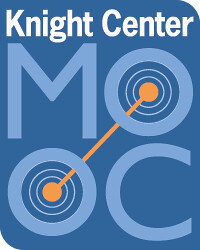Start learning today!
Get early access to learning opportunities from Journalism Courses by the Knight Center.




The Knight Center for Journalism in the Americas’ most recent Massive Open Online Course (MOOC), “Development of Journalistic Projects for the Web: an Introduction to Entrepreneurial Journalism,” began on Monday, Nov. 18 with almost 5,000 students from 45 countries, and the class is still growing. The four-week course in Spanish, which is being offered with the support of Google, has become one of the Knight Center’s most popular MOOCs and attracted the largest number of Latin American students of any other class.
Registration for this online course is still open. Click here to register.
“Development of Journalistic Projects for the Web,” which is being taught by instructor Janine Warner, is the seventh massive course the Knight Center has offered since it launched its innovative MOOC initiative on October 28, 2012. This is the Knight Center’s third MOOC in Spanish and aims to help journalists interested in launching sustainable journalistic projects on the web. The course covers business and technical aspects that have been absent from traditional journalism training.
“We are very impressed with the high level of student participation in this MOOC,” said Professor Rosental Alves, founder and director of the Knight Center. “Many Latin American journalists are discussing their projects, helping each other and learning skills about business and digital technologies that are not traditionally covered in journalism education. All Latin American countries are represented and the response to our call is amazing, with almost 5,000 participants. They are forming a vibrant leaning community, exchanging experiences and ideas.”
The course will focus on how to create business plans for digital platforms, attract audiences and develop sources of income. It will feature case studies and guest experts who will share with participants real-life examples, success stories and firsthand accounts of the challenges and opportunities that digital publications face.
And thanks to Google’s support, participants will be able to apply to a scholarship to come to the University of Texas at Austin next April to participate in two international conferences on online journalism. The Google-Knight Center Fellowship will be offered to at least six participants of the MOOC selected among those applicants who show that they effectively applied what they learned in the course to develop a new journalistic project for the web or improved an existing one. Applications will be received after the end of the course.
“We are very grateful for the support and the inspiration provided by Google Latin America,” Alves said. “We share their concerns about the need for more content in Spanish language on the web. It is really incredible that the second most spoken language in the world only accounts for 5 percent of the content on the Internet.”
This MOOC is open to anyone, from any country, and has attracted people from all continents. The Google-Knight Center Fellowship, however, is offered only to journalists, students and professors of journalism from Spanish-speaking Latin American countries. The goal is to stimulate the creation of more content in Spanish.
Although the course will be free, if participants need to receive a certificate, there will be a $30 administrative fee, paid online via credit card, for those who meet the certificate requirements. The certificate will be issued only to students who actively participated in the course and who complied with most of the course requirements, such as quizzes and exercises. The certificates will be sent via email as a PDF document. No formal course credit of any kind is associated with the certificate.
The Knight Center for Journalism in the Americas is an international leader in online training for journalists. The Center was created in 2002 in the University of Texas at Austin thanks to generous grants from the John S. and James L. Knight Foundation. SInce it launched its pioneering Distance Learning program, the Knight Center has trained more than 7,000 journalists across all Spanish-speaking countries and offered more than 100 regular online courses. In 2012 the Center launched the first journalim Massive Open Online Course (MOOC) in the world. Since then, the Knight Center’s MOOCs have reached more than 20,000 participants around the world.
Get early access to learning opportunities from Journalism Courses by the Knight Center.